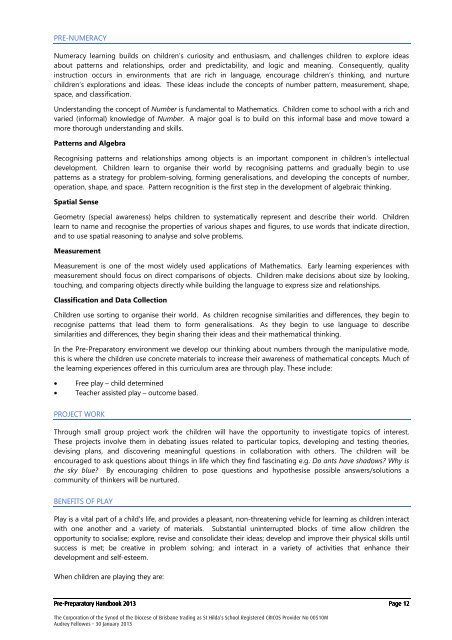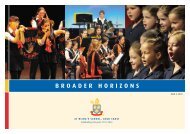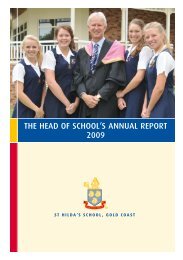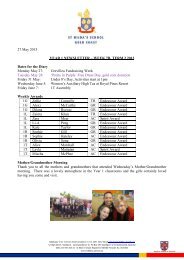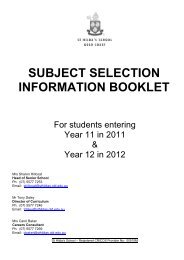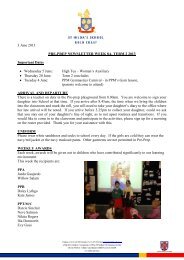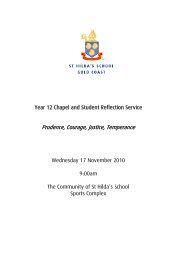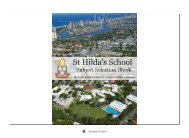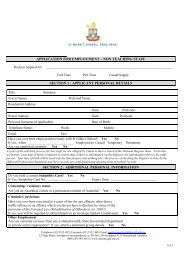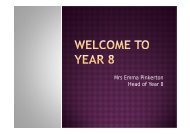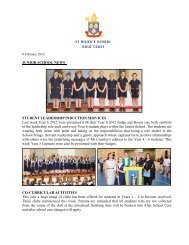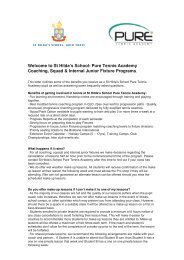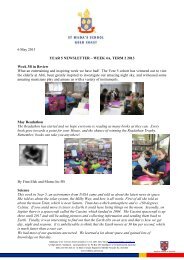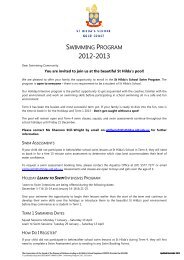Pre Prep Parent Handbook 2013 v9 - 31 January ... - St Hildas School
Pre Prep Parent Handbook 2013 v9 - 31 January ... - St Hildas School
Pre Prep Parent Handbook 2013 v9 - 31 January ... - St Hildas School
Create successful ePaper yourself
Turn your PDF publications into a flip-book with our unique Google optimized e-Paper software.
PRE-NUMERACY<br />
Numeracy learning builds on children’s curiosity and enthusiasm, and challenges children to explore ideas<br />
about patterns and relationships, order and predictability, and logic and meaning. Consequently, quality<br />
instruction occurs in environments that are rich in language, encourage children’s thinking, and nurture<br />
children’s explorations and ideas. These ideas include the concepts of number pattern, measurement, shape,<br />
space, and classification.<br />
Understanding the concept of Number is fundamental to Mathematics. Children come to school with a rich and<br />
varied (informal) knowledge of Number. A major goal is to build on this informal base and move toward a<br />
more thorough understanding and skills.<br />
Patterns and Algebra<br />
Recognising patterns and relationships among objects is an important component in children’s intellectual<br />
development. Children learn to organise their world by recognising patterns and gradually begin to use<br />
patterns as a strategy for problem-solving, forming generalisations, and developing the concepts of number,<br />
operation, shape, and space. Pattern recognition is the first step in the development of algebraic thinking.<br />
Spatial Sense<br />
Geometry (special awareness) helps children to systematically represent and describe their world. Children<br />
learn to name and recognise the properties of various shapes and figures, to use words that indicate direction,<br />
and to use spatial reasoning to analyse and solve problems.<br />
Measurement<br />
Measurement is one of the most widely used applications of Mathematics. Early learning experiences with<br />
measurement should focus on direct comparisons of objects. Children make decisions about size by looking,<br />
touching, and comparing objects directly while building the language to express size and relationships.<br />
Classification and Data Collection<br />
Children use sorting to organise their world. As children recognise similarities and differences, they begin to<br />
recognise patterns that lead them to form generalisations. As they begin to use language to describe<br />
similarities and differences, they begin sharing their ideas and their mathematical thinking.<br />
In the <strong>Pre</strong>-<strong>Pre</strong>paratory environment we develop our thinking about numbers through the manipulative mode,<br />
this is where the children use concrete materials to increase their awareness of mathematical concepts. Much of<br />
the learning experiences offered in this curriculum area are through play. These include:<br />
• Free play – child determined<br />
• Teacher assisted play – outcome based.<br />
PROJECT WORK<br />
Through small group project work the children will have the opportunity to investigate topics of interest.<br />
These projects involve them in debating issues related to particular topics, developing and testing theories,<br />
devising plans, and discovering meaningful questions in collaboration with others. The children will be<br />
encouraged to ask questions about things in life which they find fascinating e.g. Do ants have shadows? Why is<br />
the sky blue? By encouraging children to pose questions and hypothesise possible answers/solutions a<br />
community of thinkers will be nurtured.<br />
BENEFITS OF PLAY<br />
Play is a vital part of a child’s life, and provides a pleasant, non-threatening vehicle for learning as children interact<br />
with one another and a variety of materials. Substantial uninterrupted blocks of time allow children the<br />
opportunity to socialise; explore, revise and consolidate their ideas; develop and improve their physical skills until<br />
success is met; be creative in problem solving; and interact in a variety of activities that enhance their<br />
development and self-esteem.<br />
When children are playing they are:<br />
<strong>Pre</strong>-<strong>Pre</strong>paratory <strong>Pre</strong>paratory <strong>Handbook</strong> <strong>2013</strong><br />
Page 12<br />
The Corporation of the Synod of the Diocese of Brisbane trading as <strong>St</strong> Hilda’s <strong>School</strong> Registered CRICOS Provider No 00510M<br />
Audrey Fellowes – 30 <strong>January</strong> <strong>2013</strong>


